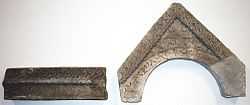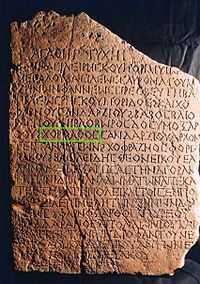Name of Croatia
The name of Croatia (Croatian: Hrvatska) derives from Medieval Latin Croātia, itself a derivation of the native ethnonym, earlier Xъrvatъ and modern-day Croatian: Hrvat.
Earliest record

The first attestation of the term is in the Latin charter of duke Trpimir from 852 AD, whose original has been lost but a copy has been preserved from 1568 transcript (Lujo Margetić has proposed in 2002 that the document is in fact of legislative character, dating to AD 840[1]). In it is mentioned:
- Dux Chroatorum iuvatus munere divino ... Regnum Chroatorum
The oldest stone inscription is the Latin Branimir Inscription (found in Šopot near Benkovac), where Duke Branimir is mentioned:
- BRANIMIRO COM ... DUX CRUATORVM COGIT...
The Old Croatian ethnonym *xъrvatъ (hŭrvatŭ) is of variant stem, and is attested in the earliest Croatian written monument, the Baška tablet from 1100 AD: zvъnъmirъ kralъ xrъvatъskъ ("Zvonimir, king of Croats").[2]
Etymology

The exact origin and meaning of the ethnonym Hrvat (Proto-Slavic *Xъrvátъ[3][4]) is not known, and scientifically varied over history.
The word is not of native Slavic lexical stock, but a borrowing.[5] Generally are accepted theories from the 20th century that is of the Iranian origin,[2][6] connection being a 3rd-century Χοροάθ- (Kh/Horóathos, Kh/Horoúathos) Scytho-Sarmatian form attested in the Tanais Tablets, an inscription from Tanais.[2] It is considered that it passed from an Iranian to a Slavic language cultural sphere.[7][8]
This form is also used to substantiated the derivation of Proto-Slavic *xъrvatъ / xŭrva:tŭ from the Old Persian xaraxwat-, attested on an Old Iranian toponym Harahvait-, the native name of Arachosia.[4] "Arachosia" is the Latinized form of Ancient Greek Ἀραχωσία - Arachosíā. In Old Persian inscriptions, the region is referred to as Harahuvatiš (![]()
![]()
![]()
![]()
![]()
![]()
![]() ).[9] However, although the suggestive similarity, it is etymologically incorrect.[10] In Indo-Iranian it actually means "one that pours into ponds", which derives from the name of (mythological) Sarasvati river.[10]
).[9] However, although the suggestive similarity, it is etymologically incorrect.[10] In Indo-Iranian it actually means "one that pours into ponds", which derives from the name of (mythological) Sarasvati river.[10]
The first etymological thesis was that of Constantine Porphyrogennetos (10th century), who connected the name of the Croats, Βελοχρωβάτοι and Χρωβάτοι (Belokhrobatoi and Khrobatoi), with the Greek word χωρα (khora, land) (Croats in Slavic language means those who have many lands).[11] Thomas the Archdeacon (13th century) considered that it was connected with the name of inhabitants of the Krk isle, Curetes, Curibantes.[12] J. Rattkay (17th century) saw in the name verb hrvati (se) (to wrestle).[12]
In the 19th century, there were given many different propositions to intrepret the Croatian ethnonym. J. Dobrovský saw in it the root hrev (tree),[12] J. K. Zeuss haru (sword),[12] S. Mikucki connected it with Old-Indian šarv- (strike),[12] P. J. Šafárik with words xrъbъtъ, xribъtъ, xribъ (ridge, highlanders),[12] F. Miklošič from hruv/hrъv (dance),[12] Đ. Daničić considered the root sar- (guard, protect),[12] L. Geitler considered that to the ethnonym are related the Lithuanian words šárvas (armor) and šarvúotas (cuirassier),[12] F. A. Braun in the name Harvata saw German Harfada (Harvaða fjöllum from Hervarar saga ok Heiðreks), what would be German name form of the Carpathian Mountains.[12] R. Much connected it with a Proto-Germanic word hruvat- (horned), or as proposed Z. Gołąb "warriors clad with horn-armour", as a self-designation.[12]
The 20th century gave rise to many new interpretations of the origin of the name of the Croats. A. I. Sobolevski derived it from the Iranian words hu- (good), ravah- (space, freedom) and sufiks -at-.[12] G. A. Ilyinsky derived it from kher- (cut), as seen in the Greek word kárkharos (sharp), kharah (tough, sharp), and xorbrъ (brave).[12] H. Hirt saw a connection with the name of a Germanic tribe Harudes (Χαροῦδες).[12] A. Bruckner linked it with Slovak charbati se (to oppose), while skъrv-/xъrv- linked with Lithuanian šárvas (armor).[12] K. Oštir considered valid the connection with an unspecified Thraco-Illyrian word xъrvata- (hill).[12] M. Vasmer first considered it as a loanword from Old-Iranian, haurvatā (shepherd) (Avestan haurvaiti means pasturage), then later from Old-Iranian hu-urvatha- (friend) (also accepted by N. Zupanič).[13] Zupanič additionally proposed Lezgian origin from Xhurava (community) and plural suffix -th, meaning "municipalities, communities".[14] M. Budimir saw in the name Indo-European *skwos (gray, grayish), which in Lithuanian gave širvas.[3] S. K. Sakač linked it with the Avestan name Harahvaitī, which once signified the southwestern part of modern Afghanistan, the province Arachosia.[3] G. Vernadsky considered the Chorasmí from Khwarezm,[15] while F. Dvornik the Krevatades or Krevatas located in the Caucasus mentioned in the De Ceremoniis (10th century).[15] V. Miller saw in the Croatian name the Iranian hvar- (Sun) and va- (bed),[3] while P. Tedesco had a similar interpretation from Iranian huravant (Sunny).[3] O. Kronsteiner derived it from Tatar-Bashkir *chr (free) and *vata (to fight, wage war).[3]
From the Iranian theses it is mostly accepted the derivation by Oleg Trubachyov,[16][6] from *xar-va(n)t (feminine, rich in women, ruled by women), which derives from the etymology of Sarmatians name, the Indo-Aryan *sar-ma(n)t (feminine), in both Indo-Iranian adjective suffix -ma(n)t/wa(n)t, and Indo-Aryan and Indo-Iranian word *sar- (woman), which in Iranian gives *har.[16] According Radoslav Katičić this thesis doesn't entirely abide with the Croatian ethnonym, as the original form was Hrъvate not Hъrvate, and the vowel "a" in the desired Iranian harvat- is short, while in Slavic Hrъvate is long.[17] Katičić concluded that of all language considerations the Iranian is at least unlikely.[17][18]
The Medieval Latin name "Croātia" is derived from North-West Slavic xrovat-, by liquid metathesis from Common Slavic *xorvat-, from Proto-Slavic *xarwāt-. The Croatian ethnonym Hrvat in the Kajkavian dialect also comes in the form Horvat, while in the Chakavian dialect in the form Harvat.[19]
Distribution
Croatian place names can be found in northern Slavic regions such as Moravia and Slovakia, along the river Saale in Germany, in Austria and Slovenia, and in the south in Greece and Albania.[20]
Thus in the Duchy of Carinthia one can find Hrvatski kotar and Chrowat along upper Mura;[21] in Middle Ages the following place names have been recorded: Krobathen, Krottendorf, Krautkogel;[21] Kraut (before Chrowat and Croat) near Spittal.[21] In the Duchy of Styria there are toponyms such as Chraberstorf and Krawerspach near Murau, Chrawat near Laas in Judendorf, Chrowat, Kchrawathof and Krawabten near Leoben.[21][22] Along middle Mura Krawerseck, Krowot near Weiz, Krobothen near Stainz and Krobathen near Straganz.[21][23]
In Slovenia there are Hrovate and Hrovača;[21] in Germany along Saale river there were Chruuati near Halle) in 901 AD, Chruuati in 981 AD,[24] Chruazis in 1012 AD,[24] Churbate in 1055 AD,[24] Grawat in 1086 AD,[24] Curewate (now Korbetha), Großkorbetha (Curuvadi and Curuuuati 881-899 AD) and Kleinkorbetha,[24] and Korbetha west of Leipzig;[21][25][3] In Moravia are Charwath[26] or Charvaty near Olomouc, in Slovakia are Chorvaty and Chrovátice near Varadka.[21] The Charvatynia near Kashubians in district Neustadt is debatable.[26]
In the southern Balkans, the Republic of Macedonia has a place named Arvati (Арвати) situated near lower Prespa;[21] in Greece there is a Charváti (Χαρβάτι) in Attica and Harvation in Argolis, as well as Charváta (Χαρβάτα) on Crete;[21][25] and Hirvati in Albania.[21]
See also
References
Notes
- ↑ Antić, Sandra-Viktorija (November 22, 2002). "Fascinantno pitanje europske povijesti" [Fascinating question of European history]. Vjesnik (in Croatian).
- ↑ 2.0 2.1 2.2 Gluhak 1990, p. 131.
- ↑ 3.0 3.1 3.2 3.3 3.4 3.5 3.6 Gluhak 1990, p. 130.
- ↑ 4.0 4.1 Gluhak 1993.
- ↑ Gluhak 1990, p. 130, 133.
- ↑ 6.0 6.1 Matasović 2008, p. 44.
- ↑ Gluhak 1993, p. 270.
- ↑ Gluhak 1990, p. 131, 133, 134.
- ↑ "The same region appears in the Avestan Vidēvdāt (1.12) under the indigenous dialect form Haraxvaitī- (whose -axva- is typical non-Avestan)."Schmitt, Rüdiger (1987), "Arachosia", Encyclopædia Iranica 2, New York: Routledge & Kegan Paul, pp. 246–247
- ↑ 10.0 10.1 Katičić 1999, p. 12.
- ↑ Gluhak 1990, p. 129, 130.
- ↑ 12.0 12.1 12.2 12.3 12.4 12.5 12.6 12.7 12.8 12.9 12.10 12.11 12.12 12.13 12.14 12.15 Gluhak 1990, p. 129.
- ↑ Gluhak 1990, p. 129-130.
- ↑ Sakač, Stjepan K. (1937), "O kavkasko-iranskom podrijetlu Hrvata" [About Caucasus-Iranian origin of Croats], Renewed Life (in Croatian) (Zagreb: Filozofski institut Družbe Isusove) 18 (1)
- ↑ 15.0 15.1 Marčinko 2000, p. 184.
- ↑ 16.0 16.1 Gluhak 1990, p. 131-132.
- ↑ 17.0 17.1 Katičić 1999, p. 11.
- ↑ Marčinko 2000, p. 193.
- ↑ Velagić, Zoran (1997), "Razvoj hrvatskog etnonima na sjevernohrvatskim prostorima ranog novovjekovlja" [Development of the Croatian ethnonym in the Northern-Croatian territories of the early modern period], Migration and Ethnic Themes (in Croatian) (Bjelovar) 3 (1-2): 54
- ↑ Goldstein 2003.
- ↑ 21.0 21.1 21.2 21.3 21.4 21.5 21.6 21.7 21.8 21.9 21.10 Gračanin 2006, p. 85.
- ↑ Marčinko 2000, p. 181.
- ↑ Marčinko 2000, p. 181-182.
- ↑ 24.0 24.1 24.2 24.3 24.4 Marčinko 2000, p. 183.
- ↑ 25.0 25.1 Vasmer 1941.
- ↑ 26.0 26.1 Marčinko 2000, p. 182.
Sources
- Vasmer, Max (1941), Die Slaven in Griechenland [The Slavs in Greece] (in German), Berlin: Verlag der Akademie der Wissenschaften
- Gołąb, Zbigniew (1990), The Origins of the Slavs: A Linguist's View., Columbus: Slavica, ISBN 978-0-89357-231-0
- Gluhak, Alemko (1990), Podrijetlo imena Hrvat [The origin of the ethnonym Hrvat] (in Croatian), Zagreb: Jezik (Croatian Philological Society)
- Gluhak, Alemko (1993), Hrvatski etimološki rječnik [Croatian etymological dictionary] (in Croatian), Zagreb: August Cesarec, ISBN 953-162-000-8
- Katičić, Radoslav (1999), Na kroatističkim raskrižjima [At Croatist intersections] (in Croatian), Zagreb: Hrvatski studiji, ISBN 953-6682-06-0
- Marčinko, Mato (2000), "Tragovi i podrijetlo imena Hrvat" [Traces and the origin of Croatian name], Indoiransko podrijetlo Hrvata [Indo-Iranian origin of Croats] (in Croatian), Naklada Jurčić, ISBN 953-6462-33-8
- Goldstein, Ivo (2003), Hrvatska povijest [Croatian history] (in Croatian), Zagreb: Novi Liber, ISBN 953-6045-22-2
- Gračanin, Hrvoje (2006), Kratka povijest Hrvatske za mlade I. - od starog vijeka do kraja 18. stoljeća [Short history of Croatia for youth I. - from the old age till the end of 18th century] (in Croatian), Zagreb: Sysprint, ISBN 953-232-111-X
- Matasović, Ranko (2008), Poredbenopovijesna gramatika hrvatskoga jezika [A Comparative and Historical Grammar of Croatian] (in Croatian), Zagreb: Matica hrvatska, ISBN 978-953-150-840-7
Further reading
| Look up Croatia in Wiktionary, the free dictionary. |
| ||||||||||||||||||||||||||||||||||||||||||
| ||||||||||||||